Accelerating Sales Success: AI-Driven Account Planning and Its Impact on the Sales Cycle
Enterprise sales teams spend approximately 20-30% of their time researching an account for an opportunity. This process becomes increasingly challenging when they are working with outdated or inadequate data, which can be the case in up to 40% of their research efforts.
The faster a sales team can close a deal, the more it boosts the company’s revenue growth. A critical phase of prospecting that often extends the total sales cycle is account planning.
This is because traditional account planning involves detailed, time-consuming, cost-heavy, analysis of potential clients to build an effective sales strategy. This cannot be scaled without incurring significant cost overruns.
But, with AI-driven account planning, Enterprise sales teams are seeing up to 30% reduction in research time, allowing sales team to focus on selling rather than manual data gathering from multiple sources.
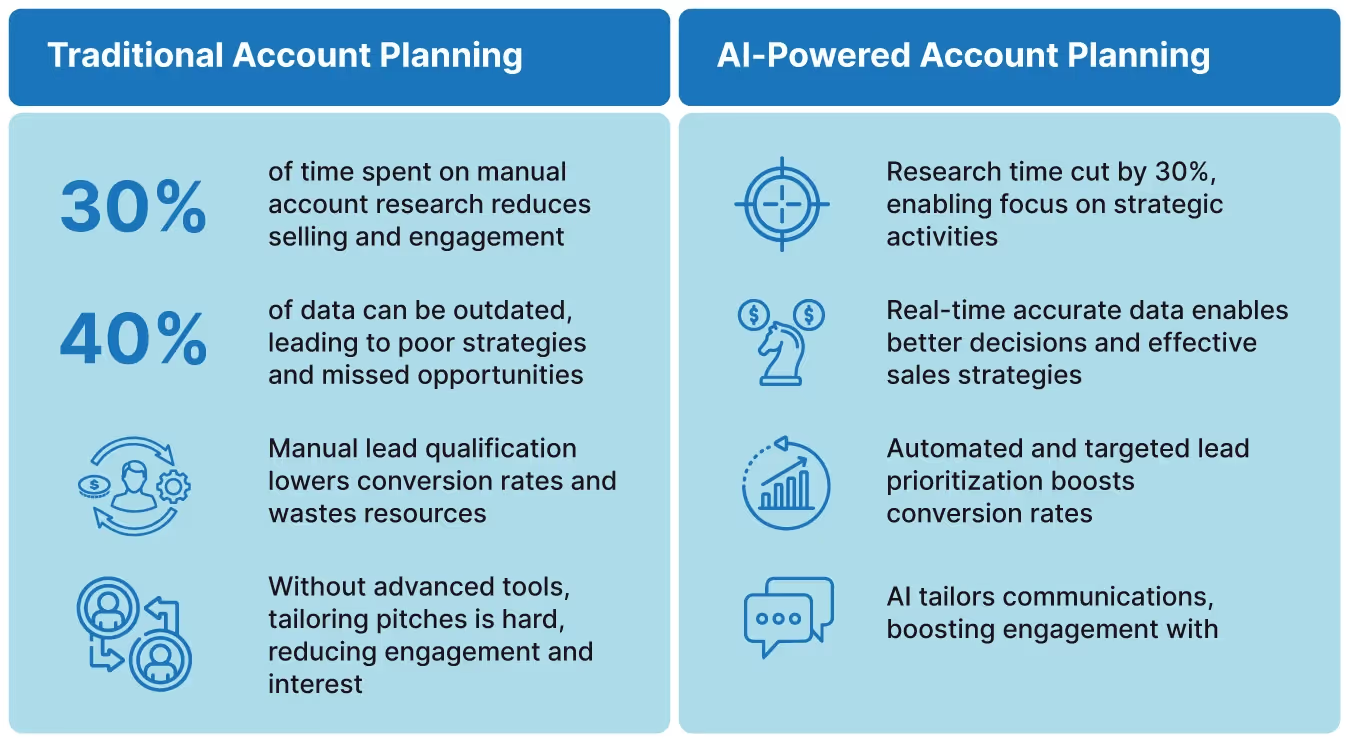
By swiftly gathering and analyzing vast amounts of data from sources like social media, market trends, firmographics, executive movements, tech stack changes and historical sales data, AI-driven account planning provides real-time deep insights into a potential client.
This enables sales teams to identify high-potential leads and tailor highly personalized strategies, with data gathered from global datasets that are updated in real-time.
Additionally, AI-powered Sales Intelligence platforms, and efficient resource allocation, and automate gathering of data to drive sales intelligence thus, freeing sales teams to focus on strategic activities.
As AI-driven account planning technology evolves, its impact on sales and account planning will grow, making it an indispensable tool for companies aiming to stay competitive in today’s dynamic market.
A study by Accenture found that 84% of sales teams that use AI-driven account planning report significant improvements in their ability to prioritize leads and accounts.
Faster Data Aggregation & Analysis with AI-Driven Account Planning
Traditional data gathering is labor-intensive and prone to human error. Sales teams can spend days, if not weeks, gathering and sifting through information. AI changes this dynamic by automating the data aggregation process.
Advanced AI algorithms can scan through millions of data points in minutes, providing sales teams with accurate and relevant information in real time.
For example, an AI-powered Sales Intelligence platform like Draup can aggregate data from diverse sources, presenting a holistic view of the account, buyer and industry information of the potential clients.
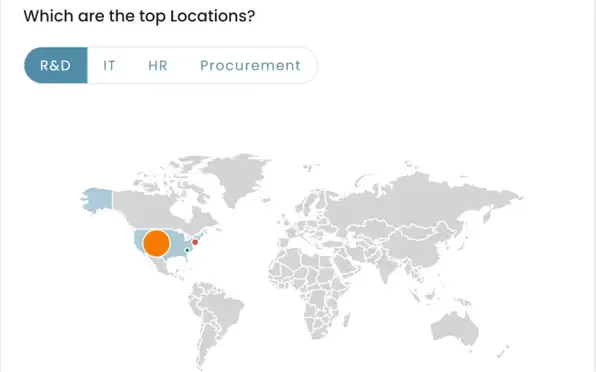
This not only saves time but also ensures that the information is up-to-date and relevant, enhancing AI-driven account planning’s overall quality.
Predictive Insights: Anticipating Client Needs and Behaviors
By analyzing historical data, AI can predict future client behaviors and needs. These predictive insights allow sales teams to proactively address potential objections and position their solutions effectively.
Predictive analytics is a game-changer in sales. It allows teams to foresee client needs before they even arise.
Imagine being able to anticipate a client’s pain points and challenges and having ready solutions even before the first meeting. This level of preparedness not only impresses clients but also accelerates the decision-making process.
Sales Intelligence tools utilize machine learning algorithms to predict client behavior based on past interactions and industry trends. These platforms analyze patterns in client data, providing sales teams with actionable insights that guide their sales strategies.
How is Draup helping with predictive analytics in sales?
Draup is significantly enhancing sales through predictive analytics by providing comprehensive and actionable insights across various dimensions. Here’s some of the many areas where Draup helps with predictive analytics in sales:
Financial Analysis and Projections –
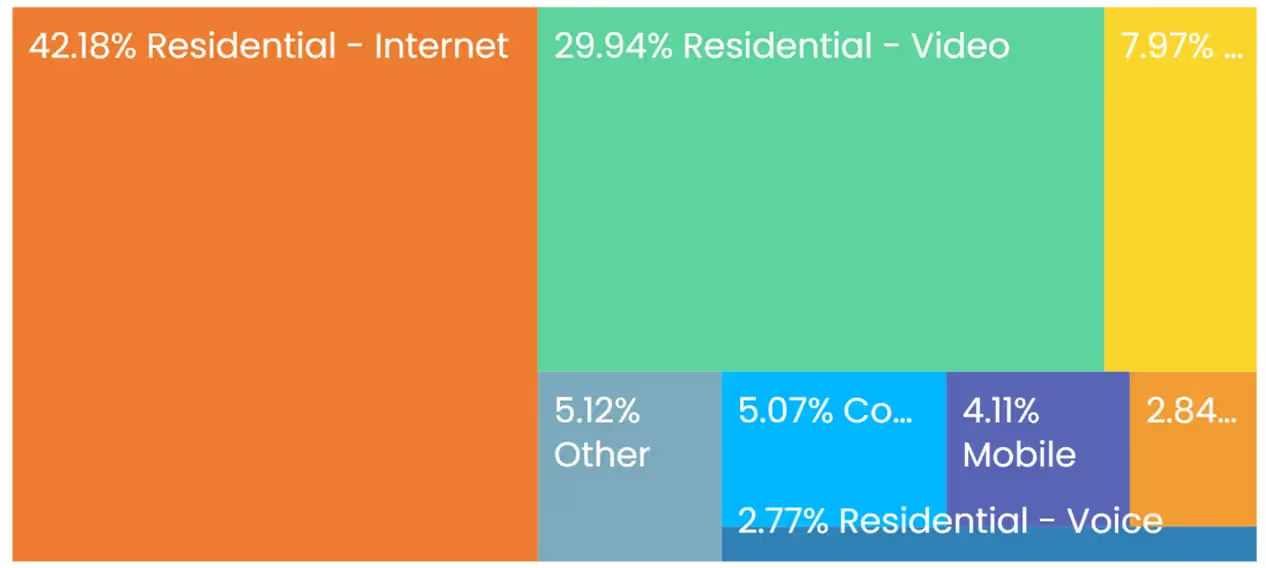
Predictive models analyze customer purchase patterns which reveals cross-selling or upselling opportunities for complementary products or services. Sales professionals can then prioritize their efforts on these opportunities to maximize revenue generation.
For example, if a company is allocating its IT budget towards cloud computing and outsourcing services, predictive models can analyze customer purchase patterns to identify cross-selling or upselling opportunities.
Sales professionals can focus on recommending complementary products such as cybersecurity solutions for cloud infrastructure or managed services for outsourced IT operations.
By prioritizing these opportunities based on predictive insights, sales teams can effectively enhance the value proposition for their customers.
Product and Service Utilization –
Draup analyses the usage patterns of organization’s digital products and services. By predicting which products are gaining traction and which are lagging, sales teams can tailor their strategies to focus on high-growth areas and optimize cross-selling opportunities.
For example, if an enterprise shows increasing adoption of Azure cloud over AWS, this analysis can be utilized by sales professionals to tailor their strategies to emphasize Azure solutions, highlight advantages over AWS, and optimize cross-selling opportunities by recommending complementary Azure services such as Azure AI or Azure IoT to capitalize on the growing adoption trend.
This targeted approach helps sales teams align their efforts with customer preferences and maximize effectiveness in promoting relevant products and services.

Strategic Hiring Insights
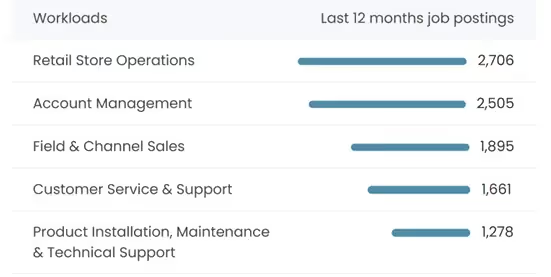
Data on hiring trends help identify sales professionals where talent acquisition efforts are likely to have the most impact, ensuring that sales teams are supported by skilled personnel in strategic areas.
For example, an enterprise business is hiring extensively for cloud engineers and AI researchers, indicating a focus on AWS and AI expansion. This suggests they’re doubling down on these solutions. Utilizing this information, sales leaders can tailor their pitch accordingly.
Executive Movements and Leadership Influence

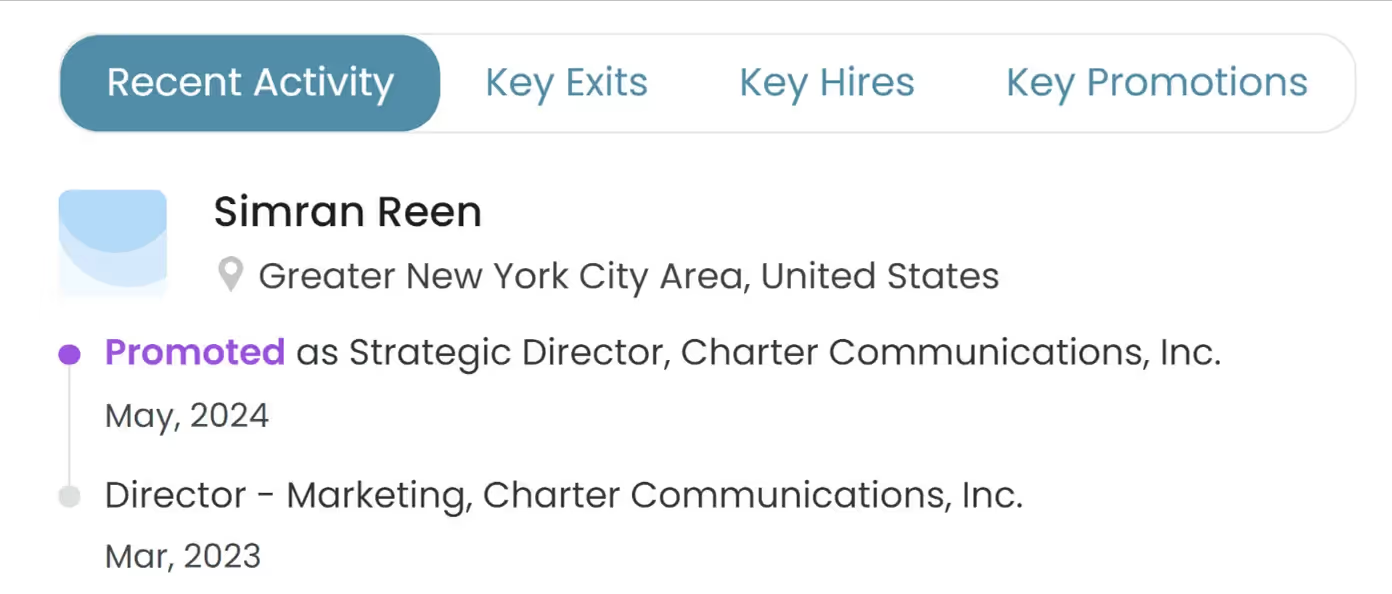
Tracking changes in leadership and having a complete understanding of decision makers can give a competitive edge to sales professionals in assessing how these changes might influence company strategy and performance and how these executives’ decisions might affect sales strategies and market dynamics.
Market and Competitive Intelligence
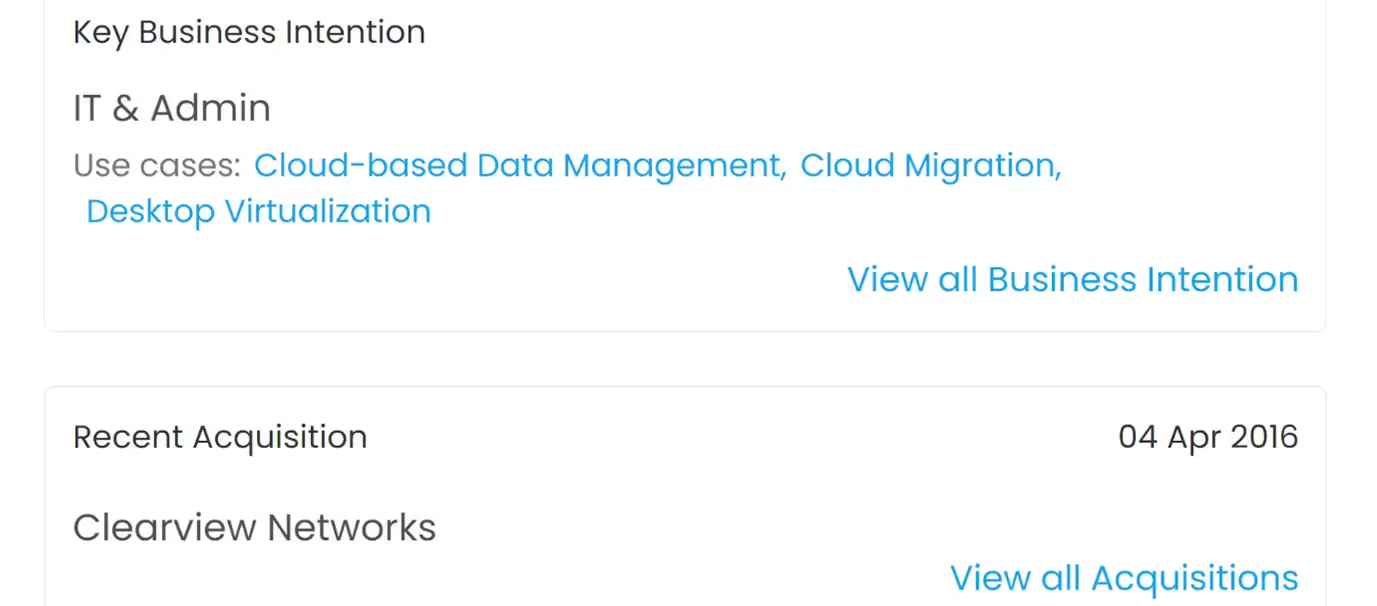
Identifying and analyzing strategic signals such as investments, acquisitions, and product launches can help sales teams stay ahead of trends and capitalize on emerging opportunities. Here’s how –
- Early Market Entry: Monitoring investments and acquisitions helps sales teams identify emerging players and initiate relationships early.
- Understanding Customer Needs: Analyzing product launches provides insights into evolving customer preferences and market demands.
- Competitive Intelligence: Tracking competitor activities informs sales strategies and helps differentiate offerings effectively.
- Market Trends and Demand: Strategic signals reflect market trends, enabling sales teams to anticipate demand and align offerings accordingly.
- Building Credibility: Being informed about industry developments enhances credibility and trust with prospects, facilitating meaningful engagements.
Intent Analysis
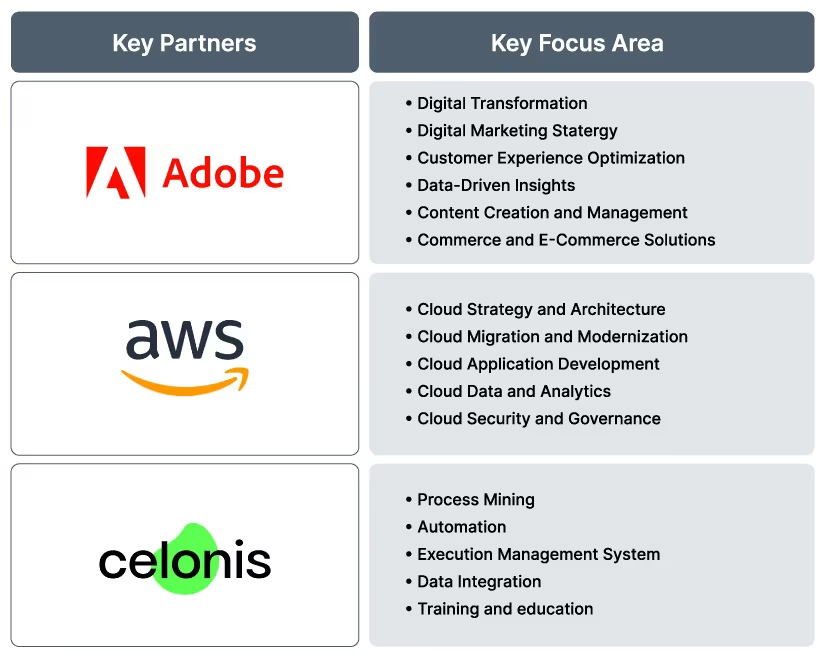
Strategic business intentions, such as market expansion plans, digital transformation initiatives and new product developments. This enables sales teams to align their efforts with the company’s strategic goals, improving coherence and effectiveness.
For example, if a company announces market expansion plans into new regions, digital transformation initiatives to enhance operational efficiency, and new product developments targeting specific market segments, sales teams can align their strategies accordingly.
They can prioritize sales efforts towards offering solutions that support the company’s expansion into new markets, provide digital transformation services or technologies that align with the initiative, and promote the new products to relevant customer segments.
This alignment ensures that sales efforts are coherent with the company’s strategic goals, enhancing effectiveness and driving growth in targeted areas.
The Future of AI-driven Account Planning and Sales: What to Expect
AI-driven account planning is just the beginning. As AI technologies continue to evolve, we can expect even more sophisticated tools that further enhance efficiency and effectiveness. Future developments may include:
- Real-time Adaptive Strategies: AI-driven account planning could continuously update and adapt sales strategies in real time based on client interactions and feedback.
- Deeper Personalization: With advancements in natural language processing and sentiment analysis, AI-driven account planning could create even more personalized and emotionally resonant sales pitches.
Conclusion
AI-driven account planning is faster, more efficient, and more effective. By automating data analysis, enhancing targeting, and personalizing strategies, AI-driven account planning shortens the sales cycle and boosts overall sales performance.
As businesses continue to embrace AI, those who leverage these technologies will undoubtedly gain a competitive edge in the ever-evolving sales landscape.
The future of sales is here, and it’s powered by AI. By integrating AI-driven account planning, sales teams can not only improve their efficiency and effectiveness but also deliver a more personalized and impactful experience to their clients.
This AI-driven account planning transformation is not just a trend – it’s a fundamental shift in how sales operations are conducted, promising a future where sales cycles are shorter, sales strategies are smarter, and client relationships are stronger.









.svg)

.svg)
.svg)
.svg)













.svg)





.svg)





.svg)
